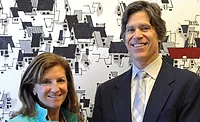Jim Ziminski On Vetting The ‘Siren Call’ Of Private Equity
The industry vet offers contractors besieged by PE propositions some sage advice

Photo by Dan Trittschuh; courtesy of Columbus Business First
As 2023 began, so too did a new era for Jim Ziminski, the roofing contractor wunderkind who helped his longtime employer, the Crane family, offload its exterior siding division, Crane Performance Siding, to Royal Building Products, before making its roofing division, Able Roofing, a nationally recognized brand.
The kismet meeting between Ziminski and his now business partner, Mike Blumenfeld, at last December’s “2022 Best of Success” conference in Scottsdale, Ariz., led to the creation of a consultancy firm, BZR Advisors, which hopes to replicate Blumenfeld’s success of consolidating multiple flooring operations under a single portfolio concern. That entity now generates more than $1 billion in revenue.
In business, six months can be a mere blip or an eternity, depending on the perspective. In this case, it was as if the universe ensured the underlayment of this new endeavor was perfectly adhered to by two men sharing similar values, ethics and goals.
“Rather than do it a ‘traditional’ way, which would be to find a contractor who wants to sell and then source [them] to different private equity groups and get someone to buy, he said, ‘Hey, let's go talk to eight or 10 private equity groups,” Ziminski said. “Find one that shares your vision, Jim, and then let's partner with them.”
And, so they did.
Ziminski is a font of knowledge about best practices dealing with private equity and offers up some important questions contractors should ask — of themselves and those interested in acquiring their labors of love — during these heady days of buying and selling, merging and acquiring.
“Some private equity firms [may] look for [companies] … on the cheap, so that [they] can put a bunch together and then roll it up,” Ziminski explained. “So they might be looking for a low valuation for a business; other private equity firms might be saying, ‘OK, we want just retail guys or storm guys.’”
He notes that, in most cases, private equity firms are interested in bottom-line revenues and whether an organizational structure will remain in place after an acquisition since most private equity firms rightly acknowledge they have no clue how to run a roofing contracting firm.
“Do you have someone that can stay and carry it on reasonably?” he asked rhetorically, roleplaying as a private equity prospector. “They're looking for the management structure; they're looking for good [bookkeeping] to determine if it’s a profitable business … [with] systems and processes that can carry on.”
For contractors reading this and thinking, “Oh, it’s time; I’m going to cash out and enjoy some fishing in the Gulf of Mexico,” it may be more complicated. Valuation is only partially a science, so it depends on how well the organization maintains its records and safeguards its reputation.
“[Private equity firms] all have different versions and models and due diligence [processes]," Ziminski said. “Once they agree and sign a letter of intent, I don't care who it is, it's a hard, arduous process. They want to know every detail of the business; the contractor needs to be prepared and make sure they have their finances in order.”
Of course, every concern is run differently. Where one principal will have spreadsheets prepared as if gearing up for a Head of State dinner, others may say, as Ziminski colorfully described it, “Hey, talk to my accountant; he does everything, and here’s my shoebox of stuff. And others are very organized. I've seen all sorts.”
Ziminski notes that while some firms want extreme organization, others may not care. “They'll do all the work, but know they're going to probably pay less for a business like that,” he said.
For Blumenfeld and Ziminski, making a fast buck is far from the point. Neither is in this for philanthropic reasons, but they agreed at the outset that reinvestment in their new endeavor, Omnia Exterior Solutions, was the priority.
Ziminski, for sure, needs not to create a vanity project. His legacy in the roofing contractor world is secure. For him, a top-line question that contractors should ask themselves is how selling will impact those who made the sale possible in the first place: the field crews, support staff and others who helped create the company in the first place.
“One of the things I heard was a lot of the owners are cashing out, but their workers, the people who helped build the business, felt like, ‘What about me? Where [do] I fit in this thing,’” he says. “And, so one of our tenants was we wanted to make sure those folks had opportunities to invest and also get some options in the business so they were financially engaged in the success of the overall platform.”
Where this great consolidation goes and when it will end are still open questions. Other industries, like HVAC, insulation, building envelope distribution and countless others, have already gone through this process and are, as they say in the world of finance, mature. Residential roofing’s turn is still relatively nascent.
“It's very early still,” Ziminski said of the new normal, offering a sports analogy: “It's early in the season, like in football or whatever; there are a lot of teams that look great, and they're going to make it, then they fizzle out, and they don't — so you're going to see some churn.”
Looking for a reprint of this article?
From high-res PDFs to custom plaques, order your copy today!







